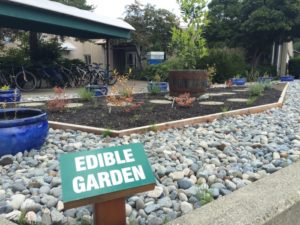Camosun College recently announced that an edible garden is now open at its Interurban campus. But the college has actually had an edible garden for many years, according to Camosun Culinary Arts chair Gilbert Noussitou, who says there have been problems with students vandalizing the garden.
“We’ve always had a difficulty in getting it maintained and finding the right people to do the work,” says Noussitou, adding that “students picking at it and literally destroying the plants” was an ongoing problem.
Noussitou decided to create a program within Culinary Arts that educated students on how to use the garden in a healthy and informed way.
“The plan was to make something nice that people would likely respect a little more than just herbs planted on the ground,” he says.
The herbs will be used by Camosun Culinary Arts students for cooking; Noussitou says the garden is used on a daily basis by students in the program.

“We have all kinds of menus and programs and so on,” he says. “Students will go there on a daily basis and pick the herbs that they need. So far the garden is a little slim because it’s fairly new.”
Noussitou says the garden will need another season to cultivate fully, and he is looking forward to the new fresh flavours that will be in some food around Camosun.
“It’s part of what we all do,” he says, “minimizing the footprint and maybe having a little better understanding of what food is about and where it’s coming from, apart from the main supplier.”
Noussitou says that the way people obtain food is starting to change, and many people are a lot more aware of where their food is grown.
“It’s part of the attitude that is changing pretty well everywhere,” he says, adding, “growing herbs is really quite easy to do.”
Noussitou says that growing food locally can create a respect for that process. But he is definitely hoping that Camosun students will show some decency around the garden and not treat it like a dumping ground.
“We’re going to put some signs up next to each herb describing them and saying a few words about what they are and how to use them,” says Noussitou, “and just hope that people are not going to start throwing cigarette butts and spitting and all kinds of things that we find in the flower bed typically.”
Noussitou says that the main thing that will help the garden to produce more plants—as he is hoping it will—is respect.
“That’s one of the reasons why we tried to make a liveable garden,” he says, saying that he’s pushing for “that respect that we’re asking everyone to have.”
